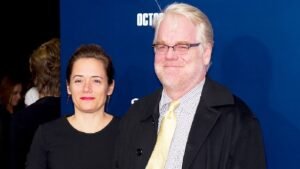Introduction: Philip Seymour Hoffman was one of the most revered actors of his generation. With a career spanning several decades, Hoffman captivated audiences with his nuanced performances and intense dedication to his craft. While his work on-screen remains iconic, many fans are curious about his personal life—particularly his relationship with his wife, Mimi O’Donnell, and how their life together Philip Seymour Hoffman Wife legacy. This article will delve into Hoffman’s personal life, career, and the impact of his untimely death, with a special focus on his wife, Mimi, and the family they created together.
Philip Seymour Hoffman: A Short Biography
Philip Seymour Hoffman was born on July 23, 1967, in Fairport, New York. From a young age, Hoffman displayed a natural talent for acting. He went on to study drama at the prestigious New York University’s Tisch School of the Arts. His career quickly flourished, and he became known for playing deeply complex characters. His most memorable performances include his Oscar-winning role in Capote (2005), The Master (2012), and Doubt (2008).
Despite being one of Hollywood’s brightest stars, Hoffman maintained a relatively private life. His focus was on his family and his craft, and he worked to maintain a low-profile outside of his professional life.
Philip Seymour Hoffman’s Wife: Mimi O’Donnell
Mimi O’Donnell, a costume designer and long-time partner of Hoffman, became a central figure in his personal life. The couple had three children together, and despite Hoffman’s fame, Mimi always maintained a discreet presence.
Relationship and Family Life
Philip Seymour Hoffman and Mimi O’Donnell met in the early 2000s, and their relationship quickly became serious. They never married officially, but they were deeply committed to each other. Hoffman’s close friends and colleagues described Mimi as a stabilizing force in his life. Despite the ups and downs of Hoffman’s battle with addiction, Mimi was always there to support him.
The couple had three children together: Cooper Hoffman (born 2003), Tallulah Hoffman (born 2006), and Willa Hoffman (born 2009). Hoffman’s children were his pride and joy, and he often spoke about them with great affection in interviews.
Mimi O’Donnell’s Career
Mimi O’Donnell’s career as a costume designer saw her working on several high-profile productions, primarily in theater and film. While she wasn’t as widely recognized in the public eye as Hoffman, her work behind the scenes was highly respected. She worked on projects such as The Seagull (2008) and The Waverly Gallery (2018), and she gained recognition for her talent and professionalism.
The Death of Philip Seymour Hoffman
Philip Seymour Hoffman tragically passed away on February 2, 2014, at the age of 46. His death, attributed to a heroin overdose, shocked the world. Hoffman’s sudden passing left a significant hole in the film industry, and his family, including Mimi O’Donnell, was devastated by the loss.
Though his death was tragic, Hoffman’s legacy endures through his impressive body of work. His children, in particular, were a source of great pride for him. O’Donnell, who had always been a private person, chose to honor Hoffman’s memory by focusing on raising their children and preserving his legacy.
Table: Biography of Philip Seymour Hoffman

| Attribute | Details |
|---|---|
| Full Name | Philip Seymour Hoffman |
| Date of Birth | July 23, 1967 |
| Date of Death | February 2, 2014 |
| Place of Birth | Fairport, New York, USA |
| Occupation | Actor, Director, Producer |
| Famous For | Oscar-winning performance in Capote, roles in The Master, Doubt, Boogie Nights |
| Spouse | Mimi O’Donnell (Partner) |
| Children | Cooper Hoffman, Tallulah Hoffman, Willa Hoffman |
| Net Worth | Estimated at $35 million (at the time of his death) |
| Legacy | One of the greatest actors of his generation, known for his depth of character portrayal and dedication to his craft |
Philip Seymour Hoffman’s Career and Achievements
Hoffman was known for his extraordinary range and ability to transform into any character. Over the years, he built an impressive portfolio of roles, from dramatic performances in movies like The Talented Mr. Ripley (1999) to his more comedic performances in Along Came Polly (2004).
Hoffman won the Academy Award for Best Actor for his portrayal of Truman Capote in the biographical film Capote (2005), and he was nominated for several other awards throughout his career. Some of his other notable films include The Hunger Games: Catching Fire (2013), Charlie Wilson’s War (2007), and Synecdoche, New York (2008).
His commitment to the craft was evident in his extensive work in theater. Hoffman worked extensively with the prestigious Off-Broadway theater group Labyrinth Theater Company and directed plays such as The Last Days of Judas Iscariot and Jack Goes Boating.
The Legacy of Philip Seymour Hoffman
Hoffman’s legacy continues to impact the film and theater industries. His unique ability to delve into the psyche of his characters set him apart from other actors, and his untimely death has only amplified his stature as one of the finest actors of his generation. His family—particularly his children—will continue to carry his legacy forward, and Hoffman’s influence is still felt by audiences and filmmakers alike.
Philip Seymour Hoffman’s Net Worth
At the time of his passing, Hoffman’s net worth was estimated to be around $35 million. This wealth was accrued through his years of work in film, theater, and television. Despite his fame, Hoffman was known for living a relatively modest lifestyle. Most of his wealth was tied to his prolific career and the residuals of his acting roles in major blockbusters.
Table: Philip Seymour Hoffman’s Net Worth and Financial Overview
| Attribute | Details |
|---|---|
| Net Worth (at time of death) | $35 million |
| Primary Source of Income | Acting, Theater, Film Production |
| Major Assets | Real Estate (New York), Residuals from films, Investments in production companies |
| Financial Disposition | Estimated that his estate has been split among his family members, with particular focus on ensuring his children’s future security |
Theater Work and Influence
Philip Seymour Hoffman’s contributions to the theater world are equally as important as his work in film. Hoffman was a passionate advocate for stage performances and believed deeply in the craft of live theater. He spent a significant part of his life working in New York City’s theater scene, particularly with the Labyrinth Theater Company, which he co-founded in 1995. The company became an important institution for contemporary theater artists, and Hoffman’s leadership helped shape its identity.
He not only acted in a variety of plays but also directed them. His directorial work was critically acclaimed for its deep psychological insight and complexity. In 2007, he directed The Last Days of Judas Iscariot by Stephen Adly Guirgis, a play that explored the biblical story of Judas’s betrayal of Jesus in a highly contemporary setting. Hoffman’s ability to bring out the nuances of these complex characters showcased his natural ability to interpret texts and deliver them with emotional depth.
In 2010, he directed the play Jack Goes Boating, in which he also acted. The production received praise for its rawness and emotional authenticity. Hoffman’s work as a director was seen as deeply personal, and many considered his productions to be reflective of his own internal struggles, giving his characters a sense of realness that resonated with audiences.
His work in theater wasn’t just limited to acting and directing. He also believed strongly in the importance of actors’ voices in developing new works. Hoffman’s support for emerging playwrights and his mentoring of young actors were instrumental in ensuring that a new generation of theater artists had the chance to thrive.
The Hunger Games and Hollywood Success

While Hoffman is best known for his indie roles and critical acclaim in dramas, his portrayal of the enigmatic and manipulative character Plutarch Heavensbee in The Hunger Games series marked a shift to more mainstream recognition. Hoffman appeared in the last two films of the franchise, The Hunger Games: Catching Fire (2013) and Mockingjay Part 1 and 2 (2014).
His involvement in the series was met with a great deal of anticipation and praise, as it was clear that Hoffman brought his trademark intensity and complexity to a role that could easily have been one-dimensional. Plutarch Heavensbee, the Head Gamemaker, was a figure who appeared to be politically savvy yet morally ambiguous, and Hoffman’s portrayal added layers to the character.
Hoffman’s role in The Hunger Games franchise remains a key part of his filmography, showing that he could transition into large-scale blockbuster franchises while still maintaining his artistic integrity.
His Legacy in Film
Hoffman’s influence on contemporary cinema is undeniable. He is often cited as one of the finest character actors in modern film history. His ability to completely immerse himself into a role and portray characters with so much complexity made him stand out in an industry that often favors leading men with more traditional, straightforward personalities.
Movies like Boogie Nights (1997), Magnolia (1999), The Master (2012), and Doubt (2008) showcased his versatility and depth. Each role he took on felt unique and fresh, with Hoffman constantly challenging himself and his audiences.
In particular, his performance as Lancaster Dodd in The Master was widely praised for its intricacy and detail. The film, directed by Paul Thomas Anderson, explored the relationship between a charismatic cult leader (played by Hoffman) and a troubled war veteran (played by Joaquin Phoenix). Hoffman’s portrayal of Dodd was a masterclass in subtlety and manipulation, showing his ability to play larger-than-life characters while still keeping them grounded in realism.
Hoffman’s film career spanned a wide array of genres. From intense dramas to dark comedies to thrillers, Hoffman was never confined to a single type of role. His vast body of work continues to serve as a source of inspiration for actors, directors, and filmmakers who strive to create multifaceted characters that feel authentic and compelling.
Philip Seymour Hoffman’s Struggles with Addiction
Like many talented artists, Hoffman’s life was marked by personal struggles, including battles with addiction. While Hoffman’s talent was undeniable, his private battles with substance abuse were frequently reported by the media. Hoffman had been sober for many years but tragically relapsed before his death.
In interviews, Hoffman often spoke openly about his addiction issues, acknowledging that he had struggled with heroin and other substances during his younger years. His decision to enter rehab in 2013 after a period of relapse indicated his recognition of the importance of staying clean.
His death was a stark reminder of how addiction can affect even the most successful individuals, and it sparked important conversations about mental health, addiction, and the pressures of fame.
Despite his battles with addiction, Hoffman remained committed to his work and his family.
Mimi O’Donnell’s Life After Hoffman’s Death
Mimi O’Donnell, after Philip Seymour Hoffman’s death, has chosen to remain largely out of the public eye, focusing on raising their children in as normal an environment as possible. O’Donnell has rarely spoken about her personal life in interviews, choosing instead to focus on her work as a costume designer.
In the years following Hoffman’s death, she has largely focused on preserving her children’s privacy and maintaining a life away from the media spotlight.
However, she has occasionally spoken about Hoffman in public, sharing anecdotes about their life together and the importance of his role as a father. O’Donnell has made it clear that her priority is ensuring that her children grow up with a sense of stability and security, despite the tragic loss they experienced at such a young age.
The Children of Philip Seymour Hoffman

Philip Seymour Hoffman’s three children have grown up in the shadow of their father’s immense legacy. While the family has made efforts to keep them out of the public eye, they have still garnered some attention due to their father’s fame. Hoffman’s eldest son, Cooper, has already begun making a name for himself in the acting world, much like his father did. In fact, Cooper Hoffman made his film debut in 2021 in Licorice Pizza, a critically acclaimed film directed by Paul Thomas Anderson.
Though it is too soon to say whether Cooper and his siblings will pursue careers in the arts, the early signs suggest that they may be following in their father’s footsteps. Given the high expectations placed on them due to their father’s legacy, it will be interesting to see how they carve out their own paths and how they choose to honor his memory in their own unique ways.
Mimi O’Donnell’s Career After Philip’s Death
Since Philip Seymour Hoffman’s death, Mimi O’Donnell has continued her work as a costume designer, though she has kept her professional life relatively private.
Her decision to maintain a low profile is likely a reflection of her desire to protect her family from the intense public scrutiny they’ve faced following Philip Seymour Hoffman’s death. By choosing to stay out of the public eye, O’Donnell has created a space for her children to grow up with as much normalcy as possible.
Conclusion
Philip Seymour Hoffman’s life was both brilliant and tragic. While his professional legacy remains one of the strongest in contemporary cinema, his personal life, particularly his relationship with Mimi O’Donnell, offers insight into the man behind the actor.
Mimi O’Donnell’s role in Hoffman’s life was pivotal. She helped anchor him during some of his most challenging times, including his battle with addiction. After his death, she remained a private figure, focusing on raising their children and preserving Hoffman’s legacy. The love they shared and their children’s future stand as a testament to the quiet strength and dedication they both exhibited, far from the limelight of Hollywood.
As we continue to remember Philip Seymour Hoffman for his extraordinary work on-screen, we also honor the life he shared with his family, especially his wife, Mimi, and their children. In every sense, Hoffman’s story remains one of profound talent, commitment, and love—a legacy that will live on for generations.
Read More Also: Mark Normand Wife: Everything You Need to Know – Bio, Age, Net Worth & More